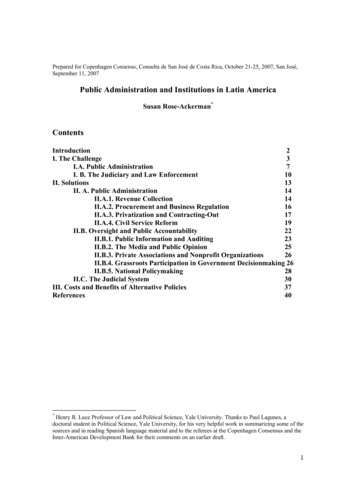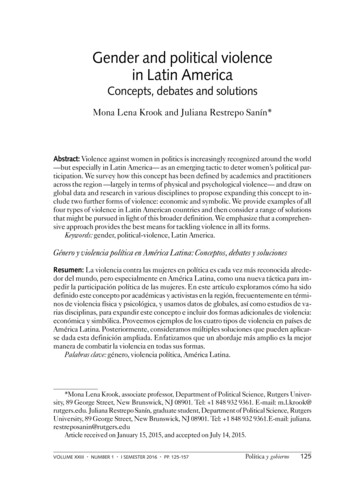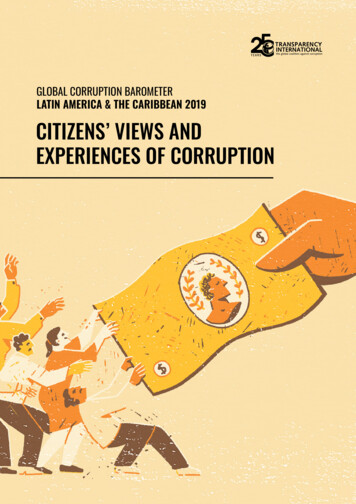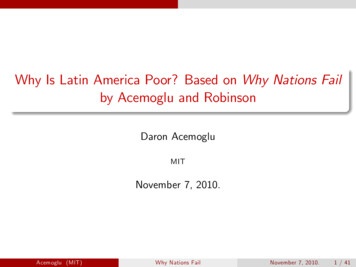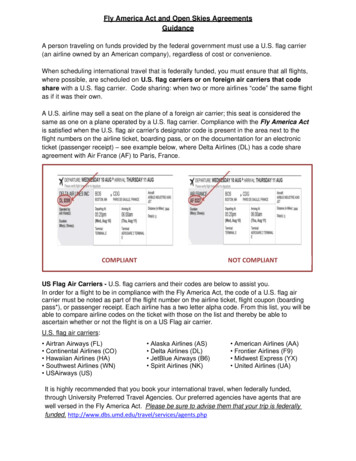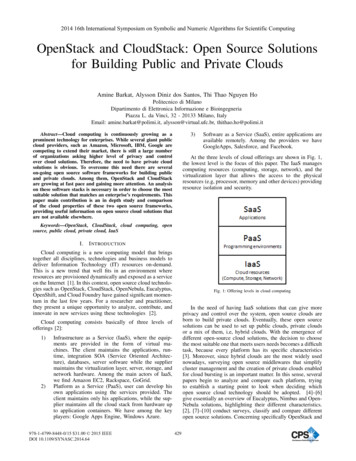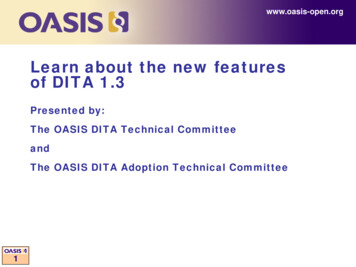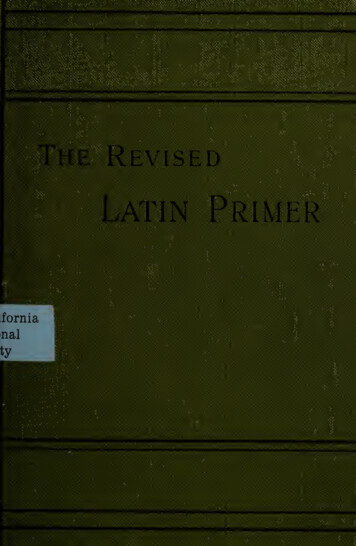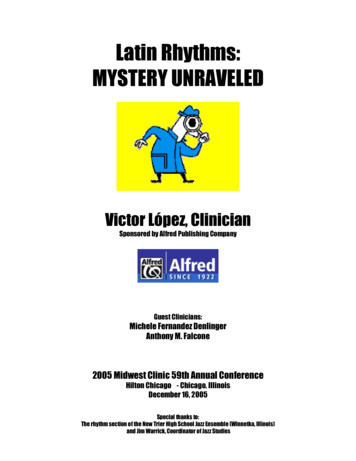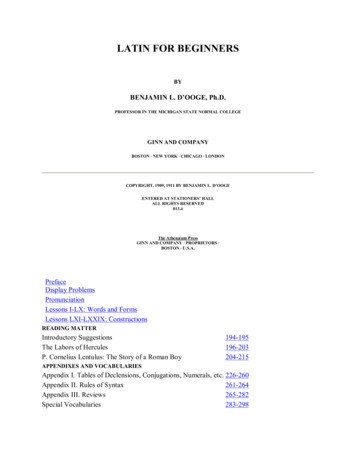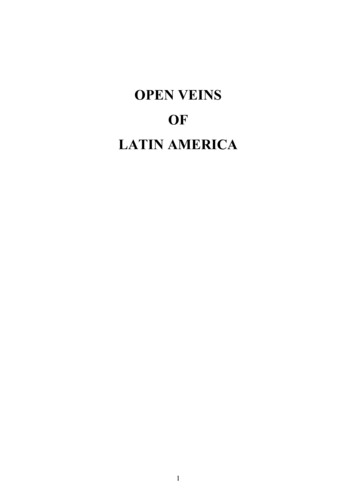
Transcription
OPEN VEINSOFLATIN AMERICA1
also by EDUARDO GALEANODays and Nights of Love and WarMemory of Fire:Volume I, GenesisVolume II, Faces and MasksVolume III, Century of the WindThe Book of Embraces2
Eduardo GaleanoOPEN VEINSofLATIN AMERICAFIVE CENTURIES OF THE PILLAGE 0F A CONTINENTTranslated by Cedric Belfrage25TH ANNIVERSARY EDITIONFOREWARD by Isabel AllendeLATIN AMERICA BUREAULondon3
Copyright 1973,1997 by Monthly Review PressAll Rights ReservedOriginally published as Las venas abiertas de America Latinaby Siglo XXI Editores, Mexico, copyright 1971 by Siglo XXI EditoresLibrary of Congress Cataloging-in-Publishing DataGaleano, Eduardo H., 1940[Venas abiertas de America Latina, English]Open veins of Latin America : five centuries or the pillage of acontinent / Eduardo Galeano ; translated by Cedric Belfrage. — 25thanniversary ed. / foreword by Isabel Allende.p. cm.Includes bibliographical references and index.ISBN 0-85345-991-6 (pbk.:alk.paper).— ISBN 0-85345-990-8 (cloth)1. Latin America— Economic conditions. 1. Title.HC125.G25313 1997330.98— dc2197-44750CIPMonthly Review Press122 West 27th StreetNew York, NY 10001Manufactured in the United States of America4
“We have maintained a silenceclosely resembling stupidity”.--From the Revolutionary Proclamationof the Junta Tuitiva, La Paz, July 16, 18095
ContentsFOREWORD BY ISABEL ALLENDE .IXFROM IN DEFENSE OF THE WORD .XIVACKNOWLEDGEMENT .XINTRODUCTION: 120 MILLION CHILDRENINTHE EYE OF THE HURRICANE . .1PART I: MANKIND'S POVERTY AS A CONSEQUENCEOF THE WEALTH OF THE LAND1. LUST FOR GOLD, LUST FOR SILVER 22. KING SUGAR AND OTHER AGRICULTURAL MONARCHS .593. THE INVISIBLE SOURCES OF POWER . . .134PART II: DEVELOPMENT IS A VOYAGE WITH MORESHIPWRECKS THAN NAVIGATORS4. TALES OF PREMATURE DEATH . .1735. THE CONTEMPORARY STRUCTURE OF PLUNDER . .205PART III: SEVEN YEARS AFTER . .263REFERENCES . 287INDEX .3076
ForewordIsabel AllendeMany years ago, when I was young and still believed that the world could beshaped according to our best intentions and hopes, someone gave me a bookwith a yellow cover that I devoured in two days with such emotion that I had toread it again a couple more times to absorb all its meaning: Open Veins ofLatin America, by Eduardo Galeano.In the early 1970s, Chile was a small island in the tempestuous sea inwhich history had plunged Latin America, the continent that appears on themap in the form of an ailing heart. We were in the midst of the Socialistgovernment of Salvador Allende, the first Marxist ever to become president ina democratic election, a man who had a dream of equality and liberty and thepassion to make that dream come true. That book with the yellow covers,however, proved that there were no safe islands in our region, we all shared500 years of exploitation and colonization, we were all linked by a commonfate, we all belonged to the same race of the oppressed. If I had been able toread between the lines, I could have concluded that Salvador Allende'sgovernment was doomed from the beginning. It was the time of the Cold War,and the United States would not allow a leftist experiment to succeed in whatHenry Kissinger called "its backyard." The Cuban Revolution was enough; noother socialist project would be tolerated, even if it was the result of ademocratic election. On September 11, 1973, a military coup7
ended a century of democratic tradition in Chile and started the long reign ofGeneral Augusto Pinochet. Similar coups followed in other countries, and soonhalf the continent's population was living in terror. This was a strategydesigned in Washington and imposed upon the Latin American people by theeconomic and political forces of the right. In every instance the military actedas mercenaries to the privileged groups in power. Repression was organized ona large scale; torture, concentration camps, censorship, imprisonment withouttrial, and summary executions became common practices. Thousands of people"disappeared," masses of exiles and refugees left their countries running fortheir lives. New wounds were added to the old and recent scars that thecontinent had endured. In this political context, Open Veins of Latin Americawas published. This book made Eduardo Galeano famous overnight, althoughhe was already a well-known political journalist in Uruguay.Like all his countrymen, Eduardo wanted to be a soccer player. He alsowanted to be a saint, but as it turned out, he ended up committing most of thedeadly sins, as he once confessed. "I have never killed anybody, it is true, but itis because I lacked the courage or the time, not because I lacked the desire," Heworked for a weekly political magazine Marcha, and at twenty-eight hebecame the director of the Important newspaper Epoca, in Uruguay. He wroteOpen Veins of Latin America in three months, in the last ninety nights of 1970,while he worked during the day in the university, editing books, magazines,and newsletters.Those were bad times in Uruguay. Planes and ships left filled with youngpeople who were escaping from poverty and mediocrity in a country thatforced them to be old at twenty, and that produced more violence than meator wool. After an eclipse that had lasted a century, the military invaded thescene with the excuse of fighting the Tupamaro guerrilla. They sacrificed thespaces of liberty and devoured the civil power, which was less and less civil.By the middle of 1973 there was a military coup, he was imprisoned, andshortly afterward he went into exile in Argentina, where he created themagazine Crisis. But by 1976 there was a military coup also in Argentina, andthe "dirty war" against intellectuals, leftists, Journalists, and artists began.Galeano initiated another exile, this time in Spain, with Helena Villagra, hiswife. In Spain he wrote Days and Nights of8
Love and War, a beautiful book about memory, and soon after he began a sortof conversation with the soul of America: Memories of Fire, a massive frescoof Latin American history since the pre-Colombian era to modern rimes. "Iimagined that America was a woman and she was telling in my ear her secrets,the acts of love and violations that had created her." He worked on these threevolumes for eight years, writing by hand. "I am not particularly interested insaving time; I prefer to enjoy it." Finally, in 1985, after a plebiscite defeatedthe military dictatorship in Uruguay, Galeano was able to return to his country.His exile had lasted eleven years, but he had not learned to be invisible orsilent; as soon as he set foot in Montevideo he was again working to fortify thefragile democracy that replaced the military junta, and he continued to defy theauthorities and risk his life to denounce the crimes of the dictatorship.Eduardo Galeano has also published several works of fiction and poetry;he is the author of innumerable articles, interviews, and lectures; he hasobtained many awards, honorary degrees, and recognition for his literary talentand his political activism. He is one of the most interesting authors ever tocome out of Latin America, a region known for its great literary names. Hiswork is a mixture of meticulous detail, political conviction, poetic flair, andgood story telling. He has walked up and down Latin America listening to thevoices of the poor and the oppressed, as well as those of the leaders and theintellectuals. He has lived with Indians, peasants, guerrillas, soldiers, artists,and outlaws; he has talked to presidents, tyrants, martyrs, priests, heroes,bandits, desperate mothers, and patient prostitutes. He has been bitten bysnakes, suffered tropical fevers, walked in the jungle, and survived a massiveheart attack; he has been persecuted by repressive regimes as well as, byfanatical terrorists. He has opposed military dictatorships and all forms ofbrutality and exploitation, taking unthinkable risks in defense of human rights.Hehasmore first-handknowledge ofLatinAmericathanany-body else I can think of, and uses it to tell the world of the dreams anddisillusions, the hopes and the failures of its people. He is an adventurer with atalent for writing, a compassionate heart, and a soft sense of humor. "We livein a world that treats the dead better than the living, We, the living, are askersof questions and givers of answers, and we have other grave defectsunpardonable by a system that believes death, like money, improves people.”9
All these talents were already obvious in his first book, Open Veins of LatinAmerica, as was his genius for story-telling. 1 know Eduardo Galeanopersonally: he can produce an endless scream of stories with noapparent effort, for an undetermined period of time. Once we were bothstranded in a beach hotel in Cuba with no transportation and no airconditioning. For several days he entertained me with his amazing stories overpina coladas. This almost superhuman talent for storytelling is what makesOpen Veins of Latin America so easy to read— like a pirate's novel, as he oncedescribed it— even for those who are not particularly knowledgeable aboutpolitical or economic matters. The book flows with the grace of a tale; it isimpossible to put it down. His arguments, his rage, and his passion would beoverwhelming if they were not expressed with such superb style, with suchmasterful timing and suspense. Galeano denounces exploitation withuncompromising ferocity, yet this book is almost poetic in its description ofsolidarity and human capacity for survival in the midst of the worst kind ofdespoliation. There is a mysterious power in Galeano's story-telling. He useshis craft to invade the privacy of the reader's mind, to persuade him or her toread and to continue reading to the very end, to surrender to the charm of hiswriting and the power of his idealism.In his Book of Embraces, Eduardo has a story that I love. To me it is asplendid metaphor of writing in general and his writing in particular.There was an old and solitary man who spent most of his time in bed. Therewere rumors that he had a treasure hidden in his house. One day some thievesbroke in, they searched everywhere and found a chest in the cellar. They wentoff with it and when they opened it they found that it was filled with letters.They were the love letters the old man had received all over the course of hislong life. The thieves were going to burn the letters, but they talked it over andfinally decided to return them. One by one. One a week. Since then, everyMonday at noon the old man would be waiting for the postman TO appear. Assoon he saw him, the old man would start running and the postman, who knewall about it, held the letter in his hand. And even St. Peter could hear thebeating of that heart, crazed with joy at receiving a message from a woman.Isn't this the playful substance of literature? An event transformed bypoetic truth, Writers are like those thieves, they take something that is real, likethe letters, and by a trick of magic they transform it into something, totallyfresh. In Galeano's tale the letters existed and they10
belonged to the old man in the first place, but they were kept unread in a darkcellar, they were dead. By the simple trick of mailing them back one by one,those good thieves gave new life to the letters and new illusions to the old man.To me this is admirable in Galeano's work: finding the hidden treasures, givingsparkle to worn-out events, and invigorating the tired soul with his ferociouspassion.Open Veins of Latin America is an invitation to explore beyond theappearance of things. Great literary works like this one wake upconsciousness, bring people together, interpret, explain, denounce, keeprecord, and provoke changes. There is one other aspect of EduardoGaleano that fascinates me. This man who has so much knowledge andwho has— by studying the clues and the signs— developed a sense offoretelling, is an optimist. At the end of Century of the Wind, the thirdvolume of Memory of Fire, after 600 pages proving the genocide, thecruelty, the abuse, and exploitation exerted upon the people of LatinAmerica, after a patient recount of everything that has been stolen andcontinues to be stolen from the continent, he writes:The tree of life knows that, whatever happens, the warm music spinningaround it will never stop. However much death may come, however muchblood may flow, the music will dance men and women as long as the airbreaths them and the land plows and loves them.This breath of hope is what moves me the most in Galeano's work. Likethousands of refugees all over the continent, I also had to leave my countryafter the military coup of 1973. I could not take much with me: some clothes,family pictures, a small bag with dirt from my garden, and two books: an oldedition of the Odes by Pablo Neruda, and the book with the yellow cover, LasVenas Abiertas de America Latina. More than twenty years later I still havethat same book with me. That is why I could not miss the opportunity to writethis introduction and thank Eduardo Galeano publicly for his stupendous lovefor freedom, and for his contribution to my awareness as a writer and as acitizen of Latin America. As he said once: "it's worthwhile to die for thingswithout which it's not worthwhile to live."11
In Defense of the WordOne writes out of a need to communicate and to commune with others, todenounce that which gives pain and to share that which gives happiness. Onewrites against one's solitude and against the solitude of others. One assumesthat literature transmits knowledge and affects the behavior and language ofthose who read. One writes, in reality, for the people whose luck ormisfortune one identifies with— the hungry, the sleepless, the rebels, and thewretched of this earth— and the majority of them are illiterate. How can those of us who want to work for a literature that helps to makeaudible the voice of the voiceless function in the context of this reality? Canwe make ourselves heard in the midst of a deaf-mute culture? The smallfreedom conceded to writers, is it not at times a proof of our failure? How farcan we go? Whom can we reach?. To awaken consciousness, to reveal identity— can literature claim abetter function in these times?. in these lands?. . Our own fate as Latin American writers is linked to the need forprofound social transformations. To narrate is to give oneself: it seems obviousthat literature, as an effort to communicate fully, will continue to be blocked .so long as misery and illiteracy exist, and so long as the possessors of powercontinue to carry on with impunity their policy of collective imbecilizationthrough . the mass media.12
. . Great changes, deep structural changes, will be necessary in ourcountries if we writers are to go beyond. the elites, if we are to expressourselves. . In an incarcerated society, free literature can exist only asdenunciation and hope. .We are what we do, especially what we do to change what we are.Inthis respect a "revolutionary" literature written for the convinced is just asmuch an abandonment as is a conservative literature devoted to the . . .contemplation of one's own navel. .Our effectiveness depends on our capacity to be audacious and astute, clearand appealing. I would hope that we can create a language more fearless andbeautiful than that used by conformist writers to greet the twilight. In Latin America a literature is taking shape and acquiring strength, aliterature. that does not propose to bury our dead, but to immortalize them;that refuses to stir the ashes but rather attempts to light the fire . perhaps itmay help to preserve for the generations to come . . . "the true name of allthings."Eduardo Galeano, 1978translation by Bobbye Ortizfrom Days And Nights of Love and War (1983)reprinted by Monthly Review Press to honor Judy Ruben13
AcknowledgementThis book would not have been possible without the collaboration, in one formor another, of Sergio Bagu, Luis Carlos Benvenuto, Fernando Frank,RogelioGarcia Lupo, Miguel Labarca, Carlos Lessa, Samuel Lichtensztejn. Juan A.Oddone, Adolfo Perelman, Artur Poerner, Carlos Quijano, German oSchilling,Karl-Heinz Stanzick, Vivian Trias, and Daniel Vidart. To them, and to themany friends who have encouraged me in the task of these recent years, Idedicate the result, of which they are of course innocent.Montevideo, 197014
Introduction: 120 Million Childrenin the Eye of the Hurricane The division of labor among nations is that some specialize in winning andothers in losing. Our part of the world, known today as Latin America, wasprecocious: it has specialized in losing ever since those remote times whenRenaissance Europeans ventured across the ocean and buried their teeth in thethroats of the Indian civilizations. Centuries passed, and Latin Americaperfected its role. We are no longer in the era of marvels when face surpassedfable and imagination was shamed by the trophies of conquest— the lodes ofgold, the mountains of silver. But our region still works as a menial. Itcontinues to exist at the service of others' needs, as a source and reserve of oiland iron, of copper and meat, of fruit and coffee, the raw materials and foodsdestined for rich countries which profit more from consuming them than LatinAmerica does from producing them. The taxes collected by the buyers aremuch higher than the prices received by the sellers; and after all, as Alliancefor Progress coordinator Covey T. Oliver said in July 1968, to speak of fairprices is a "medieval" concept, for we are in the era of free trade.The more freedom is extended to business, the more prisons have to bebuilt for those who suffer from that business. Our inquisitor-hang-man systemsfunction not only for the dominating external markets; they also providegushers of profit from foreign loans and investments1
in the dominated internal markers. Back in 1913, President Woodrow Wilsonobserved: "You hear of ‘concessions' to foreign capitalists in Latin America.You do nor hear of concessions to foreign capitalists in the United States. Theyare not granted concessions." He was confident; "Slates that are obliged . togrant concessions are in this condition, that foreign interests are apt todominate their domestic affairs. . . . ," he said, and he was right.1 Along theway we have even lost the right to call ourselves Americans, although theHaitians and the Cubans appeared in history as new people a century before theMayflower pilgrims settled on the Plymouth coast. For the world today,America is just the United States; the region we inhabit is a sub-America, asecond-class America of nebulous identity.Latin America is the region of open veins. Everything, from the discoveryuntil our times, has always been transmuted into European— or later UnitedStates— capital, and as such has accumulated in distant centers of power.Everything: the soil, its fruits and its mineral-rich depths, the people and theircapacity to work and to consume, natural resources and human resources.Production methods and class structure have been successively determinedfrom outside for each area by meshing it into the universal gearbox ofcapitalism. To each area has been assigned a function, always for the benefit ofthe foreign metropolis of the moment, and the endless chain of dependency hasbeen endlessly extended. The chain has many more than two links. In LatinAmerica it also includes the oppression of small countries by their largerneighbors and, within each country's frontiers, the exploitation by big cities andports of their internal sources of food and labor. (Four centuries ago sixteen oftoday's twenty biggest Latin American cities already existed.)For those who see history as a competition, Latin America's backwardnessand poverty are merely the result of its failure. We lost; others won. But thewinners happen to have won thanks to our losing: the history of LatinAmerica's underdevelopment is, as someone has said, an integral part of thehistory of world capitalism's development. Our defeat was always implicit inthe victory of others; our wealth has always generated our poverty bynourishing the prosperity of others— the empires and their native overseers. Inthe colonial and neocolonial alchemy, gold changes into scrap metal and foodinto poison. Potosi, Zacatecas, and Ouro Preto became desolate warrens ofdeep, empty tunnels from which the2
precious metals had been taken; ruin was the fate of Chile's nitrate pampas andof Amazonia's rubber forests. Northeast Brazil's sugar and Argentina'squebracho belts, and communities around oil-rich Lake Maracaibo, havebecome painfully aware of the mortality of wealth which nature bestows andimperialism appropriates. The rain that irrigates the centers of imperialistpower drowns the vast suburbs of the system. In the same way, andsymmetrically, the well-being of our dominating classes— dominating inwardly,dominated from outside— is the curse of our multitudes condemned to exist asbeasts of burden.The gap widens. Around the middle of the last century the world's richcountries enjoyed a 50 percent higher living standard than the poor countries.Development develops inequality: in April 1969 Richard Nixon told theOrganization of American States (OAS) that by the end of the twentiethcentury the United States' per capita income would be fifteen times higher thanLatin America's. The strength of the imperialist system as a whole rests on thenecessary inequality of its pares, and this inequality assumes ever moredramatic dimensions. The oppressor countries get steadily richer in absoluteterms— and much more so in relative terms— through the dynamic of growingdisparity. The capitalist "head office" can allow itself the luxury of creatingand believing its own myths of opulence, but the poor countries on thecapitalist periphery know that myths cannot be eaten. The United Statescitizen's average income is seven times that of a Latin American and grows tentimes faster. And averages are deceptive in view of the abyss that yawnsbetween the many poor and the rich few south of the Rio Grande. According tothe United Nations, the amount shared by 6 million Latin Americans at the topof the social pyramid is the same as the amount shared by 140 million at thebottom. There are 60 million campesinos whose fortune amounts to .25 a day.At the other extreme, the pimps of misery accumulate 5 billion in their privateSwiss or U.S. bank accounts. Adding insult 10 injury, they squander in sterileostentation and luxury, and in unproductive investments constituting no lessthan half the total investment, the capital that Latin America could devote tothe replacement, extension, and generation of job-creating means of production.Harnessed as they have always been to the constellation of imperialist rmining whether patriotism might not prove more profitable than3in
treason, and whether begging is really the only formula for internationalpolicies. Sovereignty is mortgaged because "there's no other way." Theoligarchies' cynical alibis confuse the impotence of a social class withthe presumed empty destinies of their countries.Says Josue de Castro: "I, who have received an international peace prize,think that, unhappily, there is no other solution than violence for LatinAmerica." In the eye of this hurricane 120 million children are Stirring. LatinAmerica's population grows as does no other: it has more than tripled in half acentury. One child dies of disease or hunger every minute, but in the year 2000there will be 650 million Latin Americans, half of whom will be under fifteen;a time bomb. Among the 280 million Latin Americans of today, 50 million areunemployed or underemployed and about 100 million are illiterate; half ofthem live in crowded, unhealthy slums. Latin America's three largestmarkets— Argentina, Brazil, and Mexico— together consume less than Franceor West Germany, although their combined population considerably exceedsthat of any European country. In proportion to population Latin America todayproduces less food than it did before World War II, and at constant prices therehas been a threefold decline in its per capita exports since the eve of the 1929crisis.For its foreign masters and for our commission-agent bourgeoisie, whohave sold their souls to the devil at a price that would have shamed Faust, thesystem is perfectly rational; but for no one else, since the more it develops, thegreater its disequilibrium, its tensions, and its contradictions. Evenindustrialization— coming late and in dependent form, and comfortablycoexisting with the latifundia and the structures of inequality— helps to spreadunemployment rather than to relieve it; poverty is extended, wealthconcentrated in the area where an ever multiplying army of idle hands isavailable. New factories are built in the privileged poles of development— SaoPaulo, Buenos Aires, Mexico City— but less and less labor is needed. Thesystem did not foresee this small headache, this surplus of people. And thepeople keep reproducing. They make love with enthusiasm and withoutprecaution. Ever more people are left beside the road, without work in thecountryside, where the latifundios reign with their vast extensions of idle land,without work in the city where the machine is king. The system vomits people.North American missionaries sow pills, diaphragms, intrauterine4
devices, condoms, and marked calendars, but reap children. Latin Americanchildren obstinately continue getting born, claiming their natural right to aplace in the sun in these magnificent lands which could give to all what is nowdenied to almost all.At the beginning of November 1968 Richard Nixon loudly confirmed thatthe Alliance for Progress was seven years old and that malnutrition and foodshortages had nevertheless intensified in Latin America. A few months earlier,in April, George W. Ball wrote in Life :"But at least for the next severaldecades, the discontent of poorer nations does not threaten world destruction.Shameful as it undoubtedly may be, the world has lived at least two-thirds poorand one-third rich for generations. Unjust as it may be, the power of poorcountries is limited."2 Ball had headed the U.S. delegation to the FirstConference on Trade and Development in Geneva, and had voted against nineof the twelve general principles approved by the conference for removing someof the handicaps of the underdeveloped countries in international trade.The human murder by poverty in Latin America is secret; every year,without making a sound, three Hiroshima bombs explode over communitiesthat have become accustomed to suffering with clenched teeth. This systematicviolence is not apparent but is real and constantly increasing: its holocausts arenot made known in the sensational press but in Food and AgriculturalOrganization statistics. Ball says that it is still possible to act with impunitybecause the poor cannot set off a world war, but the Imperium is worried:unable to multiply the dinner, it does what it can to suppress the diners. "Fightpoverty, kill a beggar!" some genius of black humor scrawled on a wall in LaPaz. What do the heirs to Malthus propose bur to kill all the beggars-to-bebefore they are born? Robert McNamara, the World Bank president who waschairman of Ford and then secretary of defense, has called the populationexplosion the greatest obstacle to progress in Latin America; the World Bank,he says, will give priority in its loans to countries that implement birth controlplans. McNamara notes with regret that the brains of the poor do 25 percentless thinking, and the World Bank technocrats (who have already been born)set computers humming to produce labyrinthine abracadabras on theadvantages of not being born: "If," one of the Bank's documents assures us, "adeveloping country with an average per capita5
income of 150 to 200 a year succeeds in reducing its fertility by 50 percentin a period of twenty-five years, at the end of thirty years its per capita incomewill be higher by at least 40 percent than the level it would otherwise haveachieved, and twice as high after sixty years." Lyndon B. Johnson's remark hasbecome famous: "Let us act on the fact that less than 5 invested in populationcontrol is worth 100 invested in economic growth."3 Dwight D. Elsenhowerprophesied that if the world’s inhabitants continued multiplying at the samerate, not only would the danger of revolution be increased, but there would alsobe a lowering of living standards for all peoples, including his own.The United States is more concerned than any other country with spreadingand imposing family planning in the farthest outposts. Not only thegovernment, but the Rockefeller and the Ford foundations as well, havenightmares about millions of children advancing like locusts over the horizonfrom the third world. Plato and Aristotle considered the question beforeMalthus and McNamara; in our day this global offensive plays a well-definedrole. Its aim is to justify the very unequal income distribution betweencountries and social elates, to convince the poor that poverty is the result of thechildren they don't avoid having, and to dam the rebellious advance of themasses. While intrauterine devices compete with bombs and machine-gunsalvos to arrest the growth of the Vietnamese population, in Latin Amer
The book flows with the grace of a tale; it is impossible to put it down. His arguments, his rage, and his passion would be overwhelming if they were not expressed with such superb style, with such masterful timing and suspense. Galeano denounces exploitation with uncompromising ferocity, yet this
